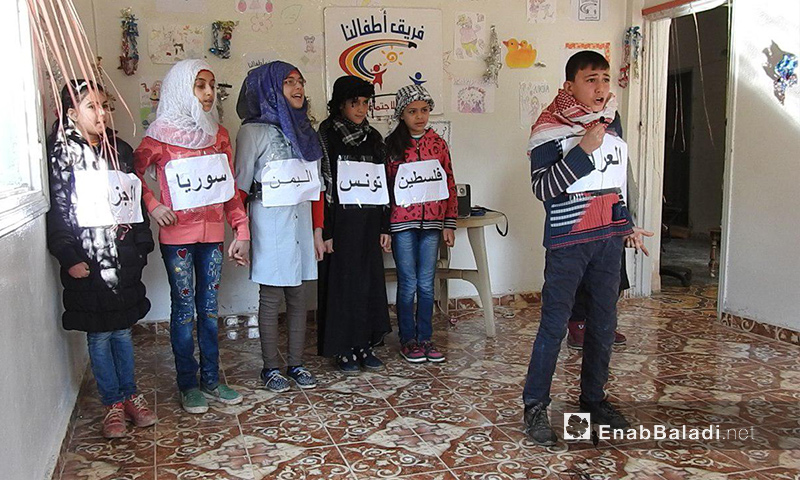



Nour al-Huda, an 11 years old girl, has played the role of Yemen in a theatrical performance called “the Arab Dialogue” in the city of al-Rastan in the northern countryside of Homs, on Thursday February 1, with the participation of a group of children, who spoke of the suffering of a number of countries, on top of which is Syria.
The performance was organized by “Our Children Volunteering Team” for social and psychological support, with the participation of seven, close in age, children, who represented: Syria, Iraq, Palestine, Yemen, Tunisia, Algeria and the “Arab Conscience.” Enab Baladi interviewed a few of them.
“Why so tired and sad?” Nour asked her friend Rahaf, 12 years old girl, who played Syria, assuring that “she found no difficulty in playing the role.” She added: “a black raven has enticed the strife and went away. Similar to our suffering in Syria, Yemen is suffering killing and displacement.”
Rahaf spoke of her role: “I loved my role because I represented my country’s pain. My voice was weak at the beginning, but I stuck to the coach’s instructions and became better towards the end.”
Ilaham, 11 years old girl, played the role of Tunisia and sent a message to all countries, which content was “In my palm, I clasp the wound; it sprouts, and the tears of nostalgia violate the eyes.” She wishes that “Arabs would start standing for each other, unlike what is happening today.”
The Team’s Head Rabeaa Aubaid told Enab Baladi that the play has been taken from the reality of the Arab countries, pointing out “that it suits the current situation and represents the separate pain of each country through the speeches that children has given, children who have been chosen for being the most skilled and creative in conducting dialogues.”
Palestine’s role was crucial, for it dies at the beginning of the play. The dialogue, then, unfolded, in which a child played the role of the “Arab conscience.” He assured that “no one is hearing these countries shout, as Palestine and others are screaming but having no answers.”
The play ends with the death of the “Arab Conscience” and the resurrection of Palestine. According to Aubaid, “training the children was difficult and continued for two weeks to organize each of the roles.” She pointed out that “the distribution of roles was based on the courage of each of the children and the role’s compatibility with each child’s personality.”
Aubaid wishes that play “has yielded results,” indicating that the goal was to attract attention to the things happening in these countries, “we did everything we could with our modest means.”
if you think the article contain wrong information or you have additional details Send Correction